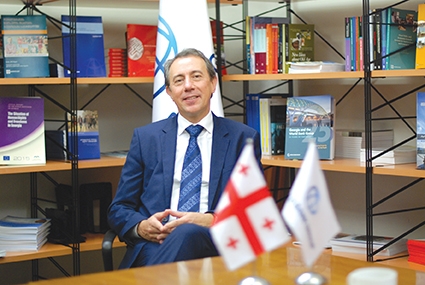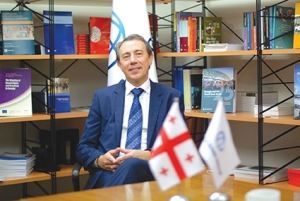Georgia: From Top Reformer to Top Performer
Exclusive Interview
This year marks the 25th anniversary of partnership between the World Bank and Georgia, celebrated with the Georgia-World Bank 25th Anniversary Forum ‘Boosting Georgia’s Development: From Top Reformer to Top Performer,’ held on September 15, with the participation of the World Bank’s senior management and Georgian government officials.
Cyril Muller, Vice President of the World Bank’s Europe and Central Asia Region, who until 2015 held the post of Vice President for External and Corporate Relations, has been working in Georgia since the very beginnings of the World Bank’s presence in the country.
GEORGIA TODAY met with Mr. Muller to look back at the last 25 years of the Georgia - World Bank partnership, and to discuss the progress the country has made and its future perspectives in social and economic development.
This year marks the 25th anniversary of World Bank - Georgia partnership. Which of the ‘milestones’ of this extensive cooperation would you particularly distinguish?
25 years is a long time for a partnership, as it is for any relationship. One of the characteristics of the World Bank’s partnership with Georgia is that it has been a vibrant partnership throughout all these years. Georgia became a World Bank member in 1992, but we weren’t able to really come and respond until 1994 due to civil strife in the country. Our first objective was to help build institutions: our first loan was $10 million for the Institution Building Project, designed to expand the government capacity to move Georgia to a market economy. At that time there were no institutions with a history; Georgia had to create government institutions, a real central bank, not just an agent of the central bank from the Soviet Union. So, in those years it was all about finding ways to support Georgia, to define what the functions of the state are, how to manage a transition to a market economy. But Georgia was in shock: the people’s income collapsed by more than 60%, and we worked hard from the beginning to help them overcome these shocks, to build a future. In those early years, we supported Georgia a lot - we supported the budget of Georgia, so the state could pay the salaries, started financing basic infrastructure that needed to be funded, and invested in energy. Initially, we were helping build a country, recovering and restoring basic services, and helping Georgia on the path to what it wanted to be in future. As Georgia was successful in doing so, it enabled us to deepen our work in other areas: over time, we focused on transport, with one of the biggest projects – the East-West Highway Improvement.
We’ve also been able to work on cultural heritage projects as part of further Regional Development projects in Kakheti, Imereti, Mtskheta-Mtianeti and Samtskhe- Javakheti. Georgia has fantastic people and an extraordinary culture and, there was a sense that to build a nation, it was really important to preserve cultural heritage, which was quite an unusual concept for us in the beginning. So, the World Bank planted the seeds of your future successes.
From a regional perspective, where in your opinion does Georgia stand given its economic/financial/investment climate and potential?
Georgia scores very highly when you look at the different indexes or the rankings that exist, for instance in the World Bank’s ranking of Doing Business, Georgia is among the top performers and has made great progress in the indexes of countries with low corruption. Georgia also made progress in terms of service delivery. Despite the initial severe collapse, I can say that Georgia has made a fantastic recovery. You always have to be careful when thinking against what that recovery will be measured. There are still a lot of people who think that it was easier in the past than it is today. Georgia is becoming a vibrant, open small economy and it means that it has to challenge itself more. If you look around the world, you’ll find that among the nations that are most prosperous, a lot have small, open economies, so the size of Georgia is not a disadvantage: it’s on the crossroads between East and West and the new Silk Road, and it has potential on the North-South route as there are opportunities now with increased trade with Turkey and Iran. Georgia can be a country that uses the opportunity of its location and continues to benefit from the investments it has made. For us this is very important. Georgia is doing much to improve its business climate, to make sure that it has an open society where not only investors, but also citizens can feel safe in living and working in, where corruption is no longer rampant, and where services are delivered. These will undoubtedly turn Georgia over time into an attractive country in this challenging region. Georgia is changing today into a country that has the potential to be stable and prosperous over a sustained time.
What key directions/trends in the country’s overall socio-economic development would you highlight as most promising and, alternatively, most risky?
I’ve worked in this country for ten years; for 10-15 years I was an observer, not having the chance to visit often, but since 2015, I’ve visited many times and if I had to choose one number that for me shows Georgia is doing things right, I’d highlight tourism. The number of tourists it has per year is impressive; tourism continues to be a great opportunity. The second –agriculture, which is a continuous challenge globally, and Georgian produce is of extremely high quality, which is another opportunity. We can make the rural economy more productive by bringing in technology and being better connected, to have choices in terms of what to grow and how to export. This needs transport infrastructure, connectivity in the country and upgraded workforce skills. The third is for Georgia to be successful in attracting both domestic and foreign investment in future. There’s a real opportunity for growing new companies, technology, the digital economy; to make sure that the small firms have a chance to grow and that there is a continues competition among them, so that people with new ideas can challenge others to improve, continuing to support entrepreneurship and moving into new areas.
Despite the progress achieved across diverse sectors (agriculture, energy, infrastructure, tourism) in recent years, unemployment and poverty rates in Georgia still remain high. What would the Bank’s recommendations be in this regard?
Georgia is growing, but needs to sustain that growth in the long-term; growth is not all about GDP or what you produce, it’s also about income. It’s a challenge of all economies, as the world economy is today growing at a level half what it was before the world financial crisis. Georgia has to work much harder today to grow at 5% than it did 10 years ago, which means its markets and expectations have to be adjusted. The second challenge I see is the significant emigration, especially of young people: if you are to be successful in the global economy, what matters most is the capacity and skill of your people. In that context, Georgia has a dual challenge; one, that people that can live productive lives, are skilled and can grow. Having a good education system is not enough: you have to be able to learn throughout your life. The second issue of human capital is that it’s an aging society; you have to make sure that the demographic challenge of the population is managed. Incentives are needed to help people to participate longer in life. Another part of that challenge is to find a way for Georgians abroad to return. As for the issue of poverty, when we first measured poverty in Georgia, over half the population was poor: in 2001, there was more than 50%. Today we are down to 21%. It’s amazing that Georgia is achieving one of the global goals of sustainable development to eliminate extreme poverty by 2030. On the current path, and with a bit of growth, and continuous effort, Georgia will do it.
Which of the areas in Georgia’s economy are most in need of improvement?
Our assessment of Georgia today, is a country that has been a strong reformer and is a strong performer, but having started from a vulnerable base. The single biggest challenge for Georgia is to be able to bring the whole country towards the project of the future in which everybody can make their contribution, with dynamic economic opportunities.
What are the steps Georgia has to undertake to achieve greater social stability, economic growth and sustainability?
Focusing on people, the one thing all countries are struggling with is lifelong learning. The Georgians are creative, dynamic; they can be argumentative, but it’s all about whether they’re able to build that energy towards the shared project which is Georgia. The second thing is, can we make sure that women can make a full contribution to the country? Could that participation in the labor force be increased? This project for the country has to be done with the involvement of all its citizens and there can be no differences between gender.
Finally, what would you, as a person who has worked on Georgia since the first years of the World Bank’s presence in the country, name as its biggest asset?
When I first worked on Georgia, I also worked on several other countries of the former Soviet Union, and on each visit to those countries, I asked people whether they expected their country to be independent in five, or ten years’ time. In the Baltic States, I got 99% of people telling me that they would be independent; of these countries, Georgia was the last to give positive answers, in part due to the civil strife, obviously. What touched me most was people’s passion to try to make it work, and at the same time, their doubts that it could happen. The biggest asset of Georgia for me is its people. In a world economy which increasingly becomes about whether or not you can connect and network with the rest of the world. Young entrepreneurs in high tech industries no more think about national borders. Georgia has real assets; this is a beautiful country in which increasing visitors can enrich its experience… The same thirst Georgia had for the first 25 years of our partnership is needed to keep it on that successful path in future.
Nino Gugunishvili
Related stories











